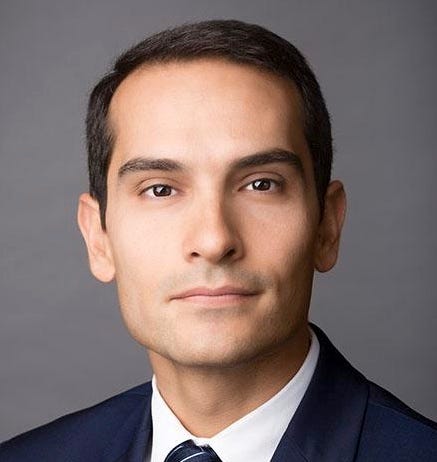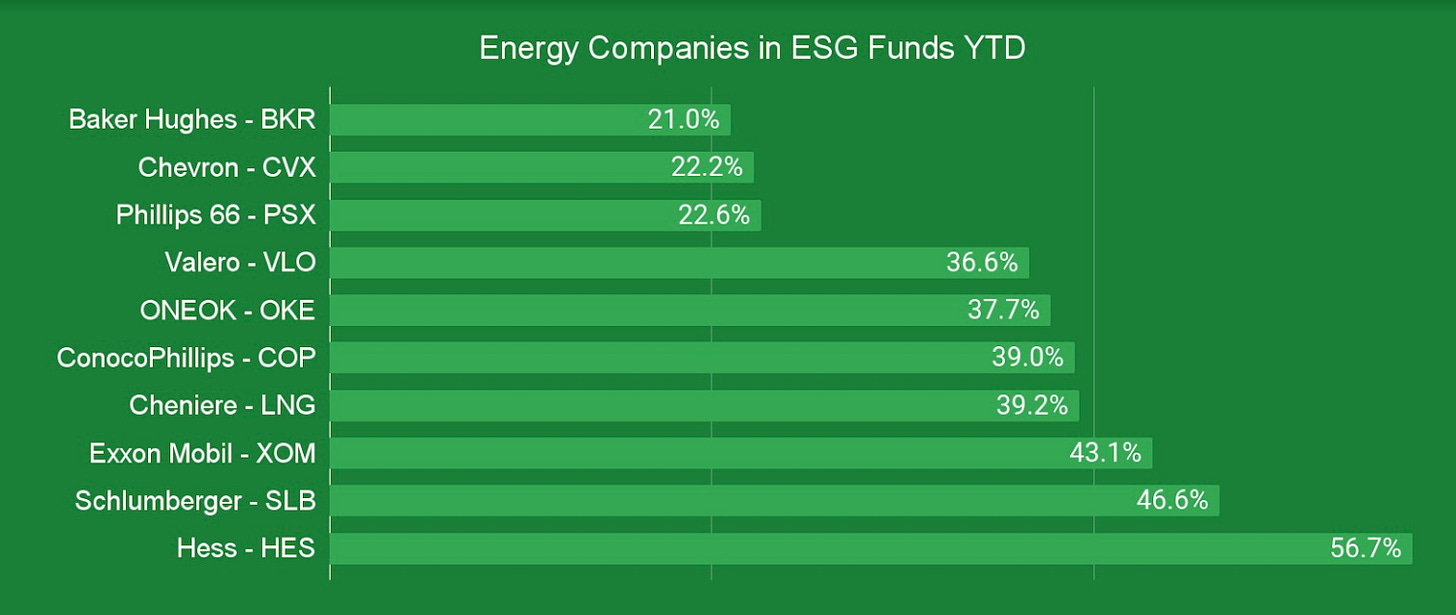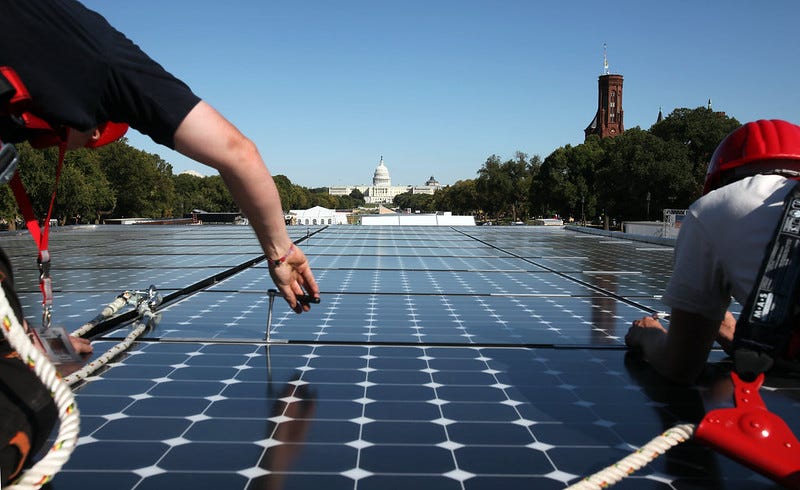Larry Summers' ESG investing tip; plus carbon trading starts in UK
Welcome to Callaway Climate Insights. Are oil stocks boosting your ESG fund? Check below, and please share with your colleagues.
An iceberg bigger than Majorca (shown nearby for scale) that calved off an Antarctic ice shelf has been spotted by satellites, and declared the world’s largest iceberg (currently). The iceberg is about 4320 square kilometers, and is not thought to have been caused by anthropogenic climate change, New Scientist reports. Named A-76, the iceberg broke off the Ronne ice shelf into the Weddell Sea in recent days, according to the European Space Agency. Image: ESA.
Asked what he would do about ESG if he ran a big university endowment, former Treasury secretary and Harvard University President Larry Summers told a Citi sustainability conference this week that he would focus exclusively on finding the next emerging green technologies, and not bother with agitating for fossil fuel divestments.
Speaking as much to university students as investors and other academics, Summers said the public battles against fossil fuel companies are a waste of time compared to energy used to create new technologies. “Getting ahead of what is going to be seen as ESG investments really is a strategy for generating positive value,” Summers said.
Against that backdrop, Google’s announcement this week of a geothermal energy deal in Nevada warrants more attention. Geothermal energy represents less than half of one percent of the electricity generated by U.S. utilities, with only seven states housing thermal energy plants. It is a classic renewable energy, coming from the earth’s core, and one only starting to attract business investment.
Following Summers’ advice, among geothermal energy stocks to watch may be Italy’s Enel SpA (IT:ENEL), Canada’s Polaris Infrastructure (CA: PIF), Sweden’s Climeon AB (SE: CLIME.B) and Ormat (ORA).
Oh yes, Summers also said inflation is worse than people think and that central banks need to focus more on rising prices and on preventing the next pandemic than climate change risk. Go figure.
More insights below. . . .
Don’t forget to contact me directly if you have suggestions or ideas at dcallaway@callawayclimateinsights.com.
Markets report: Energy companies in ESG funds
. . . . Just because you own an ESG fund doesn’t mean you don’t own any oil stocks. An MSCI study of the 20 largest ESG funds by assets under management found that 25% held shares of energy companies. The study further found that some funds without oil companies in them actually have a larger carbon intensity due to other industrial names in them. So far this year, oil and energy plays have been performing well as the U.S. economic reopening continues. Here’s a look at the year-to-date performance of energy companies held by ESG funds as identified by MSCI. . . .
Sustainability spotlight: Harvard’s George Serafeim on the millennial ESG play

. . . . The transfer of $30 trillion in wealth to a millennial generation obsessed with social impact in coming years will change everything about how ESG investing works, Harvard Business School Professor George Serafeim told the Investment Company Institute mutual fund conference recently. Marsha Vande Berg explains what this means for the nascent industry for environmental, social and governance funds and how it will alter everything from their transparency to the ways they react to material price information. . . .
ZEUS: Making your company a climate innovator, with Trane's Scott Tew

. . . . Trane Technologies shares have almost tripled in the past year, as the maker of heating and cooling systems rides the wave of renewable energy and energy efficiency. But Scott Tew, who runs its sustainability efforts, tells David Callaway a lot of its success comes from how the company views and projects its mission to its 35,000 employees. It’s a blueprint for corporate transitions to ESG practices that make money and change industries instead of just simple compliance. . . .
EU notebook: Carbon starts trading in the UK, plus the ESG investments that aren’t all ESG
. . . . Freshly-Brexited Britain started its own carbon trading scheme this week, and prices immediately diverged from those in Europe with contracts on the first day trading as high as £50 ($70.77), compared to a high last week in the European Union of 55 euros ($67), writes Vish Gain from Dublin. Trading was reported as brisk and the first-day auction of carbon offsets sold out, but not without complaints from international businesses that dividing the European market was going to cost them more in the long run. . . .
. . . . Amid the rise in ESG popularity, some funds are trying to goose performance by adding a minority of non-ESG investments. While this is likely quite common in the ESG universe, it hasn’t been advertised as a differentiator before. Next up, the fossil fuel triple-leverage transition ESG fund. . . .
Thursday’s subscriber insights: China’s answer to Ford’s F-150 will be several new brands; plus, why is everyone investing in electric aviation?

. . . . President Biden’s photo opp with the Ford’s electric F-150 pickup in Detroit this week made good video, but behind the scenes Ford (F) and other U.S. automakers are in a race for survival with a country pumping them out just as fast, and with control of the lithium battery market — China. Both countries have about the same amount of EVs on the road — near two million — but China is rapidly building plants, not to mention the Shanghai Tesla plant. The battle of the brands is just beginning, and American drivers should expect to see some new names. Read more here. . . .
. . . . Electric aviation is still more of a side hustle than a potential game-changer, but that’s not stopping investors from lining up today. This week’s investments by Fidelity and Amazon (AMZN) in BETA Technologies, the vertical take-off and landing (e-VTOL) company, illustrates the competition developing in an industry, which if successful, nobody wants to miss out on. Read more here. . . .
. . . . One of the largest methane plumes ever discovered was recorded by European Space Agency satellites in Canada last month, and was said to have emitted the equivalent of 300,000 cars worth of pollution in just an hour. Nobody knows how many hours it was leaking, but the incident illustrates that the dangers from pipelines go beyond digital hacks, and that the business of identifying methane leaks and capturing the gases from pipelines needs to scale more quickly. Read more here. . . .
Data driven: It’s all about charging and price for U.S. car buyers

. . . . A majority of U.S. drivers are interested in getting an electric car in the future, but availability of charging stations and vehicle pricing are obstacles. Survey data from Consumer Reports and Greencarreports.com show 71% of drivers surveyed last year said they were interested in getting an electric car, 27% said they would consider getting one for their next car, and 4% said they planned on making their next car electric. However, the Consumer Reports survey showed that 50% of drivers said their biggest concern was “not enough public charging stations.” They also said more charging stations along highways would increase their interest in getting an EV. . . .
Editor’s picks: It’s World Bee Day; and educating corporate boards about climate change
Editor’s note: Timmermans also spoke at the inaugural Callaway Climate Insights Dublin Climate Summit earlier this year about working with the Biden administration. Watch the full webinar.
Editor’s picks:
Today is World Bee Day
Climate Reality Project aims to educate corporate boards on climate change
Bill is tallied for Superstorm Sandy's human-induced sea-level rise damage
John Kerry on climate change and economic transformation
Read all of today’s news. Sign up with a 30-day free trial.
Latest findings: New research, studies and projects

Cryptocurrency and its environmental impact
From the abstract: Cryptocurrencies have gone a long way since their inception. While the conventional financial sector initially dismissed digital currencies as tools for crooks and speculators, the sector has made considerable progress in establishing itself as a genuine and (possibly) world-changing arena. There are still concerns about the long-term effects of widespread cryptocurrency usage. Many skeptics and environmentalists, in particular, have expressed worry about the energy consumption of cryptocurrency mining, which may result in increasing carbon emissions and climate change. The mainstreaming of cryptocurrency, as it has been dubbed, is clearly a significant event in the world of finance. It’s also a significant event in the world of, well, the globe. Whether you like cryptocurrencies or oppose them, there’s no denying that bitcoin and other proof-of-work blockchains use massive amounts of energy. Author: Kamshad Mohsin, Maharishi University of Information Technology. Available online at SSRN.
More of the latest research:
Words to live by . . . .
“The countries that take decisive action now to create the industries of the future will be the ones that reap the economic benefits of the clean energy boom that’s coming.” — President Joe Biden.






